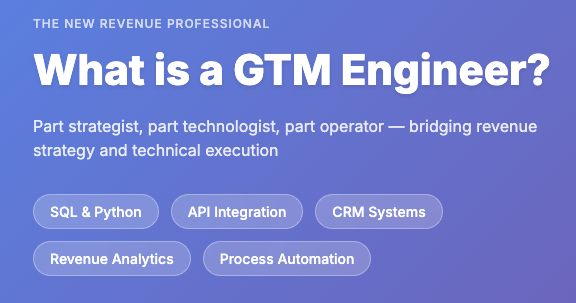In the past five years, SaaS companies have seen an explosion of complexity across their go-to-market (GTM) functions. Sales teams rely on increasingly specialized CRMs. Marketing leans on automation, attribution, and AI-powered personalization. Operations leaders juggle a stack of 20+ tools—yet still struggle to get a single source of truth.
Enter the GTM Engineer: a new breed of professional bridging the gap between revenue strategy, operations, and technical execution.
And the role isn’t niche anymore. According to LinkedIn job data, postings for “GTM Engineer” or “Revenue Systems Engineer” have more than doubled since 2022, particularly in venture-backed SaaS startups scaling past $10M ARR.
So—what exactly does a GTM Engineer do, and why is this role suddenly in demand?
Defining the GTM Engineer
A GTM Engineer (Go-to-Market Engineer) is part strategist, part technologist, and part operator. Unlike traditional Revenue Operations roles, which focus heavily on process optimization, GTM Engineers bring software engineering-level problem-solving to go-to-market challenges.
They’re not just configuring Salesforce or HubSpot. They’re:
-
Designing integrations across the GTM tech stack (CRM, MAP, product analytics, support platforms).
-
Writing automation scripts to eliminate manual work for Sales and Marketing teams.
-
Translating GTM strategy into data architecture that enables reporting, forecasting, and experimentation.
-
Partnering with Sales, Marketing, and Product teams to ensure go-to-market execution scales without breaking.
Think of a GTM Engineer as the DevOps of revenue teams: enabling speed, reliability, and scale.
Why Now? The Trends Behind the Rise of the GTM Engineer
Several forces are driving demand for GTM Engineers:
-
Tool Sprawl in SaaS
The average mid-market SaaS company now uses over 130 SaaS tools (Productiv, 2023). Sales and Marketing leaders struggle to unify data and workflows across this sprawl. GTM Engineers create connective tissue. -
Data as a Revenue Driver
Revenue leaders don’t just want dashboards—they want predictive insights and real-time GTM signals. GTM Engineers build pipelines and models to surface actionable data. -
RevOps Maturity
As RevOps evolves from an admin function to a strategic growth driver, companies realize they need technical firepower to operationalize strategy. -
AI & Automation
With AI-powered selling and marketing personalization, technical fluency is now a competitive advantage. GTM Engineers become the “builders” enabling AI adoption in go-to-market teams.
What Skills Does a GTM Engineer Need?
Hiring managers are typically looking for hybrid skill sets. A strong GTM Engineer blends:
-
Technical Skills: SQL, Python, APIs, workflow automation, system architecture.
-
Revenue Systems Knowledge: Salesforce, HubSpot, Marketo, Outreach, Gainsight.
-
Business Acumen: Understanding of SaaS metrics (ARR, CAC, LTV, churn).
-
Cross-Functional Communication: Ability to translate between GTM leaders and technical teams.
One VP of RevOps at a $50M ARR SaaS startup recently described the role as:
“Half architect, half problem-solver. They know enough code to break down silos, but they also understand pipeline coverage and quota attainment.”
Real-World Examples
-
Notion and Figma have built RevOps Engineering teams focused on scaling complex integrations between product usage data and GTM systems.
-
Datadog has open job postings for “GTM Engineers” to support their rapidly expanding enterprise sales org.
-
A LinkedIn search in August 2025 shows 300+ open roles for GTM Engineers and Revenue Systems Engineers, compared to fewer than 100 just two years ago.
This isn’t a one-off experiment—it’s an industry trend.
Why SaaS Leaders Should Care
For founders and C-level executives, hiring GTM Engineers is not just about efficiency. It’s about enabling scale. Without engineering-level support, revenue teams risk:
-
Broken funnels (data silos between marketing and sales).
-
Wasted spend (tools that don’t integrate or automate properly).
-
Slower growth (teams bogged down in manual work instead of selling).
For Ops, Sales, and Marketing leaders, GTM Engineers are force multipliers. They free up time, create scalable processes, and unlock the insights needed to hit aggressive growth targets.
The Future of GTM Engineering
Just as DevOps became an indispensable function in software engineering, expect GTM Engineering to become standard in SaaS companies scaling past $20M ARR.
Within five years, we’ll likely see:
-
Formal GTM Engineering career paths inside RevOps orgs.
-
Standard certifications and training programs.
-
A redefinition of RevOps, with GTM Engineers as the technical backbone.
Here’s the expert prediction: By 2028, RevOps teams without GTM Engineers will be the exception—not the rule.
Final Takeaway
A GTM Engineer is the bridge between strategy and systems in modern SaaS companies. They don’t just keep the revenue engine running—they make sure it scales.
If you’re a SaaS founder or executive wrestling with tool sprawl, messy data, or RevOps bottlenecks, it may be time to ask: Do we need a GTM Engineer?
👉 Ready to explore how a GTM Engineer could accelerate your growth? Schedule a call with our team to discuss how we can help you design a scalable go-to-market engine.

Leave a Reply